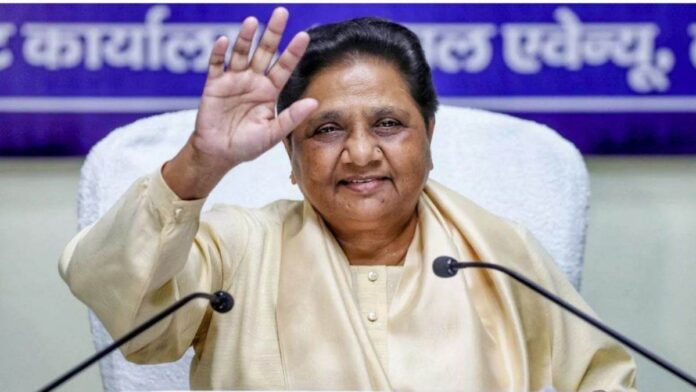Mayawati’s decision to actively campaign in Uttarakhand, a state where the BSP has traditionally held a relatively weak position, has raised questions about the party’s strategic calculations

Amit Pandey
In the 2024 Uttarakhand elections, the presence of Mayawati’s Bahujan Samaj Party (BSP) has raised eyebrows among political observers. The party’s sudden resurgence in the state, after remaining largely dormant for the past five years, has led to speculations about its true intentions.
Mayawati’s decision to actively campaign in Uttarakhand, a state where the BSP has traditionally held a relatively weak position, has raised questions about the party’s strategic calculations. Historically, the BSP has found its stronghold in the neighboring state of Uttar Pradesh, where Mayawati has enjoyed a significant following among the Dalit and other marginalized communities. However, in the case of Uttarakhand, the party’s electoral performance has been lackluster, with the party often struggling to even secure a single seat in the state assembly.
The timing of Mayawati’s resurgence in Uttarakhand is particularly intriguing, as it coincides with the upcoming Lok Sabha elections in 2024. The state is set to go to the polls in a single phase on April 19th, 2024, covering all the parliamentary constituencies, including Haridwar, Tehri Garhwal, Almora, Garhwal, Nainital, and Udham Singh Nagar.
One of the primary arguments made by the critics of Mayawati’s strategy is that her party’s presence in Uttarakhand is aimed at splitting the anti-BJP vote, thereby helping the ruling National Democratic Alliance (NDA) to retain its stronghold in the state. The logic behind this argument is that the BSP’s participation in the elections will likely draw away a significant portion of the Dalit and other marginalized voters from the opposition parties, particularly the Indian National Congress (INC), which has traditionally been the main challenger to the BJP in Uttarakhand.
Furthermore, the fact that Mayawati has not been particularly vocal in her criticism of the ruling BJP government, either at the state or the national level, has added to the suspicion that her party’s involvement in the Uttarakhand elections may be more about political calculations than genuine opposition to the incumbent regime.
Critics argue that the BSP’s active campaigning could potentially fracture the anti-BJP vote bank, inadvertently bolstering the National Democratic Alliance’s (NDA) position in the state. This theory posits that the BSP’s presence might siphon off votes from the Indian National Congress (INC), traditionally the BJP’s primary contender in Uttarakhand, thereby altering the electoral equilibrium.
Mayawati’s conspicuous silence on key issues and her restrained critique of the BJP’s governance have led to conjectures about the BSP’s true stance. This reticence has been interpreted by some as a deliberate strategy, allowing the BSP to navigate the political waters without committing to a direct confrontation with the ruling party.
The BSP’s ability to resonate with the local electorate will be a decisive factor in the upcoming elections. The party’s grassroots efforts to engage with voters, understand their concerns, and articulate a vision for Uttarakhand’s development will be critical in determining its electoral fortunes.
It is worth noting that Mayawati’s absence from the political landscape in Uttar Pradesh and other states over the past five years has also been a source of concern for her supporters. Her prolonged silence on crucial issues and her reluctance to take a strong stand against the BJP’s policies have led many to question the relevance and purpose of the BSP’s political strategy.
Ultimately, the impact of Mayawati’s involvement in the Uttarakhand elections on the opposition parties will depend on various factors, including the ability of the BSP to connect with the local electorate, the strategic calculations of the other opposition parties, and the overall political dynamics in the state.
It is worth noting that the 2024 Uttarakhand elections will be a crucial test for both the ruling BJP and the opposition parties, as the state’s results could have significant implications for the national political landscape. In this context, the role and influence of Mayawati and the BSP will be closely watched and analyzed by political observers and the electorate alike.
In the context of the Uttarakhand elections, Mayawati’s sudden appearance and her aggressive campaigning in the state have further fueled these doubts. The lack of any substantial criticism of the BJP government’s performance or the articulation of a clear policy agenda for the state has only added to the perception that the BSP’s involvement in the elections is more about political maneuvering than genuine opposition.
The role of Mayawati and the BSP in the 2024 Uttarakhand elections remains a subject of intense scrutiny and speculation. While the party’s sudden resurgence in the state may be interpreted as a strategic move to split the opposition vote and aid the BJP’s electoral prospects, it is also possible that Mayawati has a more nuanced political calculation that is not immediately apparent to the casual observer.
The true motivations behind the BSP’s involvement in the Uttarakhand elections will only become clearer as the campaign unfolds and the results are announced. However, the party’s past record and Mayawati’s recent political decisions will continue to be closely watched and analyzed by political commentators and the electorate alike.


